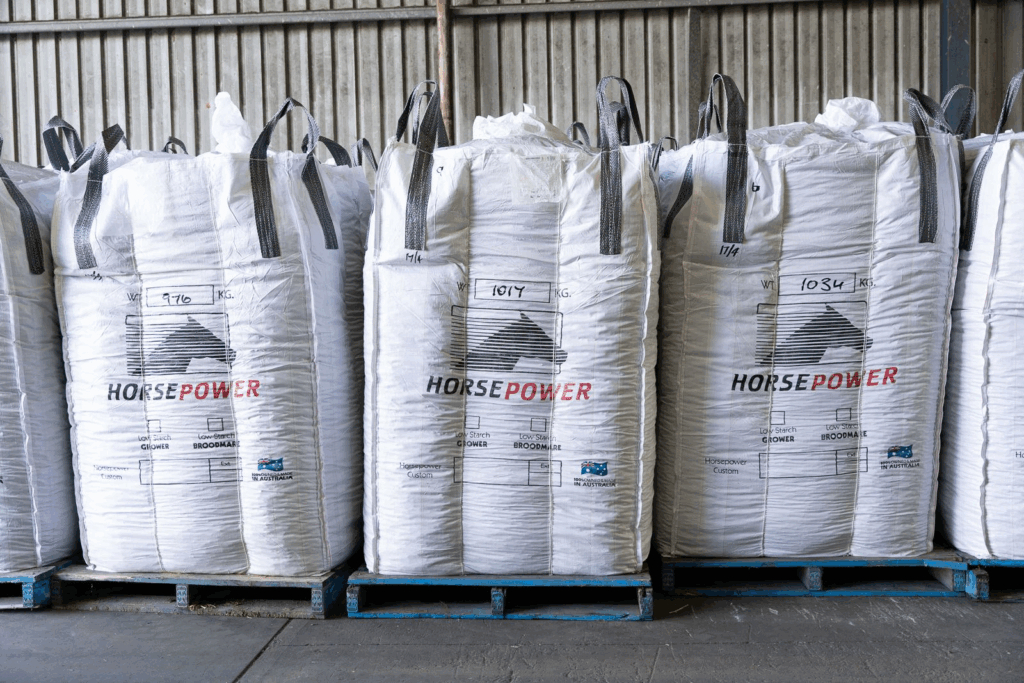How to choose the right bulk bags (FIBCs) for your industry

Bulk bags are an important part of managing and transporting different materials and waste.
As such, they are vital for a wide variety of industries, from mining to agriculture and more. So how do you know which type of bulk bag is right for your industry?
In this article, we’ll detail the different types of bulk bags available in Australia and what they are ideally used for. With this guide, you can find what type you need and what to look for from bulk bag suppliers.
For personalised advice on bulk bags or any other packaging products, contact our team at Polesy today.
Why finding the right FIBCs matters
Flexible Intermediate Bulk Containers (FIBCs) are large bags that hold a significant amount of materials. However, they also come in a range of different designs and constructions, making some bulk bags better suited for different purposes.
Choosing the wrong bulk bag for your industry could result in your bag breaking under the weight. This could mean that you lose or damage your materials and products, significantly impacting your bottom line. It could even cause a fire or other hazards to occur, depending on the materials you are transporting.
Ultimately, the right bulk bag will keep your products safe during transport, ensuring your hard work does not go to waste.
The different types of bulk bags
There are four different types of bulk bags, each made from slightly different materials for a different purpose: A, B, C and D. However, they can all come in different types of designs and construction as well. Here, we’ll outline the different types and what they are used for.
FIBC A
Type A FIBCs, made from standard woven polypropylene, are ideal for transporting non-flammable products in environments free from flammable gases or solvents. They are widely used for general applications due to their durability and cost-effectiveness.
However, it’s critical to avoid using these bags in the following scenarios:
- When transporting flammable materials
- In areas where flammable vapours or gases are present
- In any environment with a minimum ignition energy below 1,000 millijoules
FIBC B
Type C Bulk Bags are specifically designed with interwoven conductive threads to safely dissipate static electricity. However, their safety depends entirely on one critical step: proper grounding during both filling and discharging. Without grounding, the risk of electrostatic discharge increases significantly, particularly in environments handling flammable powders or vapours.
Best uses for Type C Bulk Bags include:
- Transporting combustible powders
- Operations in flammable or explosive atmospheres
- Facilities requiring strict electrostatic control
- Not safe if grounding fails or resistance is present
FIBC D
D Crohmiq bulk bags are engineered specifically for static-sensitive environments.
These static dissipative FIBCs are built with anti-static fabric that safely neutralises the risk of incendiary sparks and brush discharges. Unlike Type B or C bags, Type D bags do not require grounding, making them ideal for complex or mobile operations.
Best suited for:
- Transporting flammable powders
- Operations where flammable gases, vapours, or combustible dusts are present
Not recommended for:
- Non-flammable or non-combustible products
- Environments without ignition risk
- Situations where the bag’s surface is coated or contaminated with grease or flammable material
If static control is a critical factor in your supply chain, these bags offer a reliable, no-grounding-required solution that meets international safety standards.
Finding the right design
While choosing the right material is crucial, the design of your bulk bag can also have a significant impact. Here we’ll outline just a few of the more popular designs and what they are used for.
Ventilated bags
These breathable bags are designed to allow airflow through the fabric, making them ideal for moisture-sensitive produce like potatoes and onions. By preventing mould and rot, they help preserve crop quality from harvest through storage. They’re also well-suited for sea-farming and mussel cultivation, where air circulation is equally critical.
Best Use Cases:
- Potato and onion farming, where moisture buildup is a known issue
- Mussel farming and other aquaculture operations requiring breathable containment
Not Recommended For:
- Fine products that may leak through the weave
- Situations where air or external contaminants could damage the contents
Circular woven bags
Circular FIBC (Flexible Intermediate Bulk Container) bags, crafted from seamless tubular fabric, offer superior strength and durability, critical when storing or transporting materials like flour, sand, or chemical powders. Their unique construction eliminates vertical seams, significantly reducing the risk of leakage or contamination.
Circular FIBC bags are designed to meet your specific load, shape, and handling requirements. These bags are already trusted in agriculture, construction, mining, and chemical sectors for their:
- Seamless design for reduced material loss
- High tensile strength for heavy-duty use
- Compatibility with automated filling and discharge systems
All your custom bulk packaging in one place
At Polesy, we take pride in supplying quality bulk bags for all industries. Whether you need stronger materials for heavy loads or shock-protected bags for flammable substances, we’ve got what you need. Explore our expansive collection of bag types and designs today to find the perfect fit for your needs.